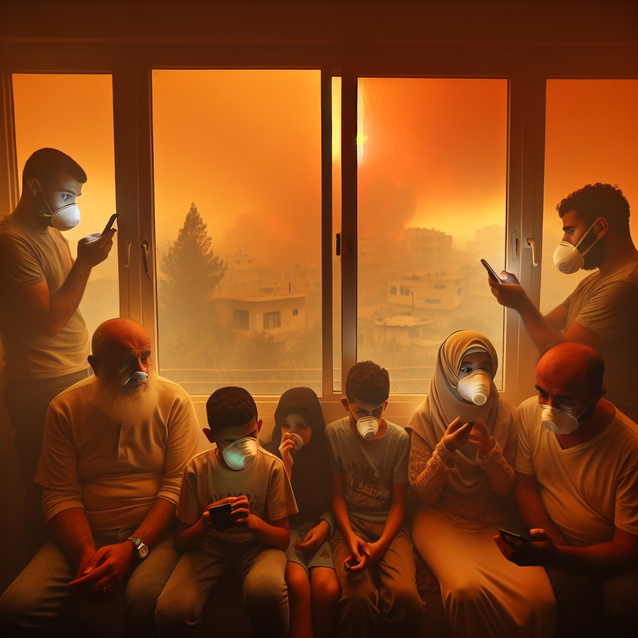Did you know that the smoke from wildfires could be almost twice as deadly as we thought? That’s what new research is showing. For years, we’ve all seen those eerie orange skies and thick plumes of smoke on the news (or maybe right outside our windows). But it turns out, the real danger isn’t just what you see—it’s what you breathe in.
## What’s Lurking in Wildfire Smoke?
Let’s start with what’s actually in wildfire smoke. When trees, plants, and even buildings burn, they release all kinds of stuff into the air. But scientists are especially worried about something called “fine particulates,” or PM2.5 if you want to sound fancy at dinner parties. These are tiny bits—so small you can’t see them—that float around in the smoky air.
The problem is these particles get deep into your lungs when you breathe them in. And once they’re there, they can cause all sorts of trouble for your body. The scary part? According to a recent study highlighted on Reddit, the deaths linked to short-term exposure to these fine particulates might have been underestimated by a whopping 93%. That’s almost double what we thought before.
So, basically: breathing in wildfire smoke is a lot more dangerous than anyone realized.
## The Hidden Cost of Every Smoky Day
You might think that unless you live right next to a raging wildfire, you’re safe. But smoke travels—sometimes hundreds of miles. All it takes is a shift in wind, and suddenly cities far away from any flames are shrouded in haze.
Short-term exposure (we’re talking days or even hours) to heavy smoke has been linked with spikes in hospital visits and deaths from heart and lung problems. And with wildfire seasons getting longer and more intense thanks to climate change, this is becoming a yearly ordeal for millions.
Here’s what makes wildfire smoke so tricky:
– The particles are smaller than dust or pollen, so they slip past your body’s natural defenses.
– They hang around in the air for days.
– They seep indoors—even if you close windows and doors.
– Air quality can change quickly; sometimes you don’t realize it’s bad until you’re already feeling it.
And according to this new research, we’ve been underestimating how deadly even short-term exposure can be.
## A Smoky Day Hits Home
I’ll never forget last summer when my little town got hit by drifting wildfire smoke from hundreds of miles away. I remember waking up one morning; our kitchen smelled like someone had just put out a campfire in it. You couldn’t see the hills across the street—the whole world looked like an old sepia photo.
My neighbor Pat, who has asthma, was stuck inside for almost a week. She kept checking her phone for air quality updates like it was the weather report. My own throat felt scratchy after just walking the dog around the block.
We were lucky—it only lasted a few days for us. But now I wonder: how many people had worse symptoms? How many folks didn’t realize their headaches or coughs were actually from those invisible particles floating around?
## How Can You Protect Yourself?
If wildfire smoke is that much riskier than we thought, should we just hold our breath until winter? Not quite—but there are some practical things everyone can do.
Here’s a quick list:
– **Check air quality reports** before going outside (apps like AirNow or your local weather site can help).
– **Keep windows and doors closed** during smoky days.
– **Use an air purifier** with a HEPA filter if you have one.
– **Wear an N95 mask** outdoors if the smoke is really thick—those cloth masks from 2020 won’t do much here.
– **Limit outdoor activity**, especially if you have heart or lung issues (or young kids).
– **Make a clean room** in your house—a space where you run an air purifier and keep doors closed as much as possible.
It doesn’t take living next door to a forest fire to feel the effects of this stuff.
## Are We Ready for More Smoky Summers?
The big takeaway here is that we might not be prepared for just how dangerous wildfire smoke really is. If scientists say we’ve underestimated its dangers by almost double, public health messaging—and our own habits—might need to catch up fast.
Think about all those days when schools didn’t cancel recess because “it didn’t look too bad,” or when people still went jogging because “the fire’s pretty far away.” If even brief exposure puts us at risk, maybe it’s time to rethink how seriously we take these smoky spells.
So here’s my question:
Have you ever noticed health effects during smoky days—or changed your routine because of poor air quality? If so, how did you cope? Drop your stories below—let’s learn from each other before next summer rolls around!

Leave a Reply